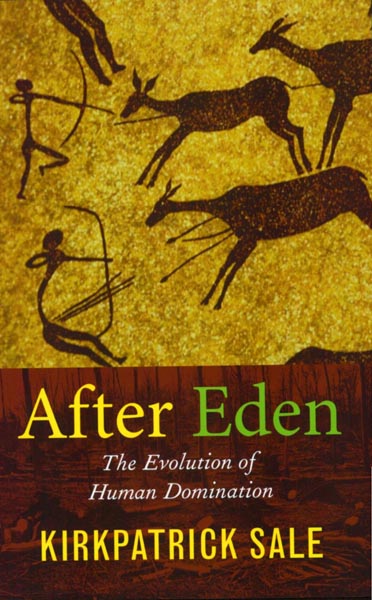 After Eden After Eden
The Evolution of Human Domination
Kirkpatrick Sale
Narrated by Gary Regal
Available from Audible
Book published by Duke University Press
When did the human species turn against the planet that we depend on for survival? Human industry and consumption of resources have altered the climate, polluted the water and soil, destroyed ecosystems, and rendered many species extinct, vastly increasing the likelihood of an ecological catastrophe. How did humankind come to rule nature to such an extent? To regard the planet’s resources and creatures as ours for the taking? To find ourselves on a seemingly relentless path toward ecocide?
In After Eden, Kirkpatrick Sale answers these questions in a radically new way. Integrating research in paleontology, archaeology, and anthropology, he points to the beginning of big-game hunting as the origin of Homo sapiens’ estrangement from the natural world. Sale contends that a new, recognizably modern human culture based on the hunting of large animals developed in Africa some 70,000 years ago in response to a fierce plunge in worldwide temperature triggered by an enormous volcanic explosion in Asia. Tracing the migration of populations and the development of hunting thousands of years forward in time, he shows that hunting became increasingly adversarial in relation to the environment as people fought over scarce prey during Europe’s glacial period between 35,000 and 10,000 years ago. By the end of that era, humans’ idea that they were the superior species on the planet, free to exploit other species toward their own ends, was well established.
After Eden is a sobering tale, but not one without hope. Sale asserts that Homo erectus, the variation of the hominid species that preceded Homo sapiens and survived for nearly two million years, did not attempt to dominate the environment. He contends that vestiges of this more ecologically sound way of life exist today—in some tribal societies, in the central teachings of Hinduism and Buddhism, and in the core principles of the worldwide environmental movement—offering redemptive possibilities for ourselves and for the planet.
Kirkpatrick Sale is the author of a dozen books, including The Fire of His Genius: Robert Fulton and the American Dream; Rebels against the Future: The Luddites and their War on the Industrial Revolution: Lessons for the Computer Age; The Green Revolution: The American Environmental Movement, 1962–1992; and The Conquest of Paradise: Christopher Columbus and the Columbian Legacy. He is a member of the American Association for the Advancement of Science and a former editor at the New York Times Magazine.
REVIEWS:
“Critically, Sale underscores our human propensity to live in an objective world, and he does so in a flowing, friendly writing style that provokes admiration and applause. He carefully documents his way through the paleoanthropological literature in his accounting of our evolution.”
—PaleoAnthropology “This is a highly readable book. The value of this study is that it investigates an achievement that many take for granted (humans becoming the dominant species on this planet). This work, both well researched and documented, also provides extensive notes.”
—Environmental History “An elegant, brief ... and very readable re-telling of human prehistory. Sale nicely conveys the synergy of human relations with nature—domination isn't a simple one-time event but rather an evolving process, with humans at particular times and places making changes to their natural setting and those changes in turn causing humans to change and make further changes to nature, or to migrate with their nature-dominating technologies to new places and resume the process there. ”
—Asheville Global Report “Kirkpatrick Sale is the outstanding radical writer of the English-speaking world today.... He reaches some mind boggling conclusions, but what is riveting is the route by which he travels: how man the hunter-gatherer moved on to become the agriculturalist, and then man the urban city dweller, all the time stressing how the basic psychic cords of his nature from his earliest stages have continued to persist and how their failure to prevail can only be as transient as they may prove tragic.”
—The Ecologist “After Eden is a gift, the first fruits of six years of reflection. It is an offering of archaeology, anthropology, paleontology, sociology, and a dozen cousin disciplines upon the altar of theology. For surely the reader who enters into Kirkpatrick Sale’s world will emerge wanting to ask God a few questions.”
—Anglican Theological Review “After Eden is ... packed with information, extremely well-written, and full of stimulating ideas concerning the origins of domestication.... Dense but highly stimulating and exciting to read. A valuable addition to the anti-civ library. Grab it.”
—Green Anarchy
|

